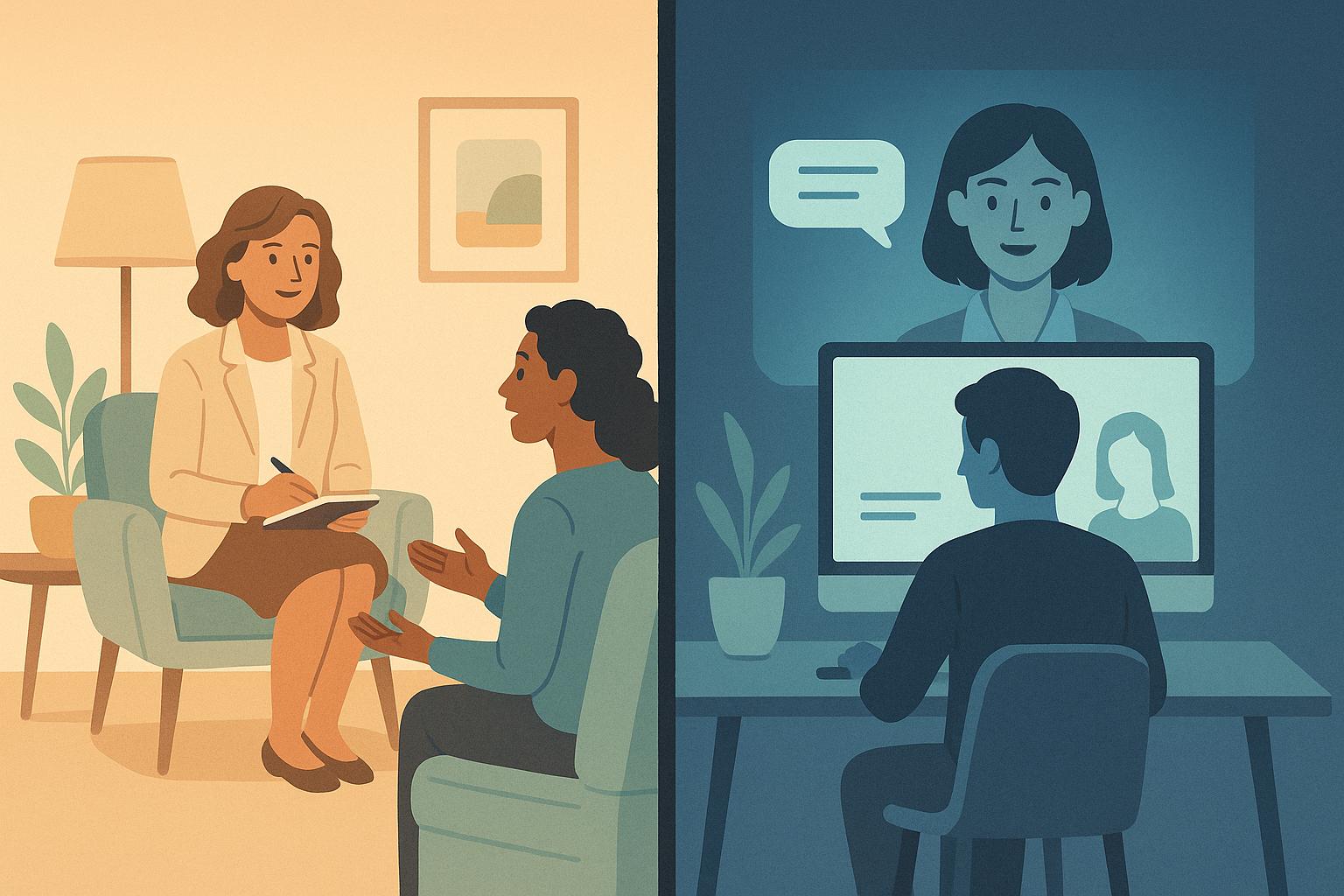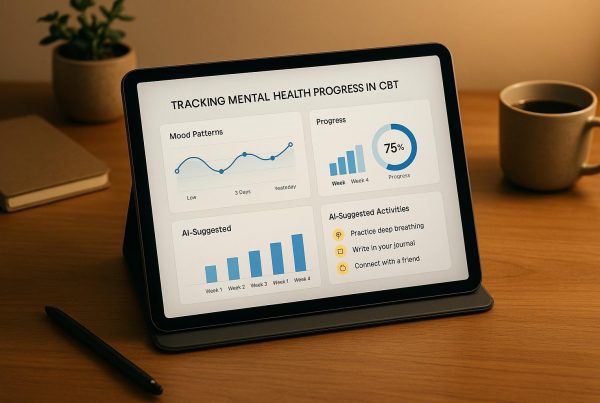AI coaching and therapy both help during life changes like career shifts or personal challenges, but they work differently. AI coaching is 24/7, affordable, and quick, while therapy offers in-depth emotional support through face-to-face sessions. Here’s how they compare:
- AI Coaching: Costs ~$21.75/month, available anytime, great for quick advice and habit-building.
- Therapy: Costs $100–200/session, scheduled weekly, best for trauma or deep emotional issues.
Quick Comparison Table:
| Feature | AI Coaching | Therapy |
|---|---|---|
| Availability | 24/7 | Scheduled sessions |
| Cost | ~$21.75/month | $100–200/session |
| Response Time | Instant | Delays between sessions |
| Best For | Everyday challenges | Complex emotional issues |
Tip: Use AI coaching for daily support and therapy for deeper emotional needs – or combine both for better results.
How AI Coaching and Therapy Work
AI Coaching Basics
AI coaching leverages advanced technology to provide personalized support. Many leading platforms use systems like Adaptive Therapeutic Intelligence (ATI), which integrates proven methods such as CBT (Cognitive Behavioral Therapy), DBT (Dialectical Behavior Therapy), and NLP (Neuro-Linguistic Programming).
Here’s a breakdown of key features:
| Feature | Description | Benefit |
|---|---|---|
| Personalized Journey | Adjusts responses based on user history | Tailored growth and guidance |
| Voice Interface | Enables natural, conversational input | Convenient, hands-free support |
| Built-in Tools | Tracks goals, sets reminders, monitors progress | Promotes actionable steps |
These features allow users to engage in a dynamic and customized experience. As one coach shared:
"Aidx has been surprisingly human in identifying problems & asking the right questions. But faster! I got sucked into the conversation like I was talking to an educated & empathetic therapist & every suggestion sent me to where I needed to go. When you’re in quick need of help, attention & direction I think this will be an incredible tool to help people find & hear what they need so they can then take the next necessary steps."
– Hali, Strength & Mobility Coach [1]
The technology adapts in real-time, offering personalized check-ins and follow-ups to keep users on track. This flexible, tech-driven approach stands apart from the more rigid structure of traditional therapy.
Therapy Basics
Traditional therapy, on the other hand, focuses on creating a personal connection through scheduled, in-depth sessions. It emphasizes face-to-face interaction with licensed professionals, fostering a therapeutic relationship built on trust and understanding.
Key elements include:
| Component | Purpose | Approach |
|---|---|---|
| Professional Assessment | Expert evaluation of needs | One-on-one consultations |
| Structured Sessions | Dedicated time for therapeutic work | Regularly scheduled meetings |
| Treatment Planning | Progress driven by specific goals | Tailored intervention strategies |
| Clinical Expertise | Guidance from trained professionals | Evidence-based methods |
A mental health professional shared their perspective on integrating AI tools like Aidx:
"As a mental health professional committed to supporting individuals who struggle with how their thoughts and feelings impact them, I was intrigued about the concept of Aidx. After trying it for myself I have found that it has had a positive influence on how I approach my own issues and difficulties. I found its timely and personalized email reminders to be useful to help me reflect on previous problems and also to remind me to seek help again when needed. It also helped me to see things from a different perspective, reminded me how to problem-solve for myself, and gave me reassurance that there was support that I could rely on (any time of the day or night) if and when I needed it. I would recommend Aidx to anyone, and I can see how it could be a great tool and addition to the experience my own clients could have."
– Cleo Brooks, Psychologist & Mental Health Clinician [1]
Traditional therapy prioritizes the human element, offering a safe space for clients to explore their emotions and challenges in depth, guided by professional expertise.
AI Therapy Exposed: Clinical Psychologist Reviews AI …
Support During Life Changes
Life changes can be tough – whether it’s a career shift, the end of a relationship, or a focus on personal growth. Knowing how AI coaching and traditional therapy differ in supporting these transitions can help you choose the right option for your mental health needs.
Key Differences Between AI Coaching and Therapy
AI coaching and traditional therapy take very different approaches to supporting life transitions. Here’s a breakdown of how they compare:
| Aspect | AI Coaching | Traditional Therapy |
|---|---|---|
| Availability | Available 24/7 | Scheduled sessions, usually weekly |
| Cost | Around $21.75/month | $100–200 per session |
| Response Time | Immediate support | Delays between sessions |
| Interaction Style | Voice or text-based | In-person conversations |
| Progress Tracking | Automated tools and reminders | Self-managed tracking |
| Crisis Support | Always accessible | Limited to office hours |
These comparisons highlight AI coaching’s ability to provide constant, on-demand support during long or challenging transitions. For example, it’s particularly useful in professional changes, where it has been shown to boost productivity and focus for individuals and teams [1]. AI coaching offers personalized motivation, effective coping techniques, and conflict resolution strategies, making it a valuable tool for navigating workplace challenges.
AI coaching platforms like ATI incorporate methods such as Cognitive Behavioral Therapy (CBT), Dialectical Behavior Therapy (DBT), Neuro-Linguistic Programming (NLP), and mindfulness techniques. This combination helps users tackle both emotional and practical challenges, offering actionable tools to manage change while staying balanced.
For example, Aidx.ai provides 24/7 personalized coaching, combining these strategies to help users handle life transitions with confidence and clarity. This sets the stage for a deeper look at the strengths and limitations of each approach.
sbb-itb-d5e73b4
Pros and Cons
Looking at AI coaching and traditional therapy side by side highlights their strengths and weaknesses when it comes to navigating life transitions.
AI Coaching: Pros and Cons
Here’s a breakdown of what AI coaching brings to the table – and where it might fall short.
Advantages:
- Available 24/7 for instant support
- Costs about 80% less than traditional therapy
- Offers more privacy and reduces stigma
- Tracks progress consistently over time
- Accessible across multiple platforms (web, mobile, chat)
- No need to worry about scheduling appointments
Limitations:
- May not provide the emotional depth needed for handling complex trauma
- Unsuitable for severe mental health conditions
- Some users might find it too impersonal
Interestingly, about 75% of people are open to using AI for mental health support[1]. Men, in particular, are showing greater acceptance – being three times more likely to open up to AI-based therapy compared to working with a human therapist[1].
Therapy: Pros and Cons
Traditional therapy offers a more personal and deeply emotional approach, but its structure can sometimes delay immediate help.
Advantages:
- Builds a strong emotional connection
- Can interpret non-verbal cues effectively
- Designed to address complex trauma
- Provides oversight from licensed professionals
- Offers in-person interaction for a more personal experience
- Tailored treatment plans for specific needs
Limitations:
- Sessions can be expensive, ranging from $100–200 per session
- Availability may be limited, with long waitlists
- Requires scheduling, which can be restrictive
- Geographic location may limit access
- Less frequent support compared to AI coaching
- Often involves a long-term commitment
For many, the wait can be a challenge – 50% of therapy seekers face delays in getting appointments[1]. These factors can help you weigh which option aligns better with your personal needs and circumstances.
Making the Right Choice
Choosing between AI coaching and traditional therapy depends on your specific needs and the type of support you’re looking for during life transitions. Below, you’ll find insights into when each option works best and how combining them can offer a well-rounded approach.
Best Uses for AI Coaching
AI coaching provides quick and consistent support for everyday challenges. It’s particularly helpful for:
- Work-related stress
- Building new habits
- Staying accountable
- Navigating career changes
- Managing time effectively
- Improving communication skills
"Aidx has been surprisingly human in identifying problems & asking the right questions. But faster! I got sucked into the conversation like I was talking to an educated & empathetic therapist & every suggestion sent me to where I needed to go. When you’re in quick need of help, attention & direction I think this will be an incredible tool to help people find & hear what they need so they can then take the next necessary steps."
– Hali, Strength & Mobility Coach [1]
When to Choose Therapy
Traditional therapy is ideal for addressing deeper emotional challenges that require professional expertise. It’s best suited for:
- Processing trauma or grief
- Managing diagnosed mental health conditions
- Resolving deep emotional issues
- Navigating relationship conflicts
- Overcoming addiction
- Coping with major life crises
"I would recommend Aidx to anyone, and I can see how it could be a great tool and addition to the experience my own clients could have."
– Cleo Brooks, Psychologist & Mental Health Clinician [1]
Combining AI Coaching and Therapy
For a comprehensive support system, you can pair AI coaching with traditional therapy. Use AI coaching for daily check-ins, immediate feedback, and tracking progress between therapy sessions. This combination helps reinforce strategies from therapy while taking advantage of AI’s affordability and 24/7 availability.
"It is truly game changing and will shake the industry very quickly."
– Salvija, Abuse Expert and Clinical Hypnotherapist [1]
Conclusion
Support during life transitions is changing, with AI coaching becoming an important addition to traditional therapy. Recent statistics reveal that 75% of people are open to AI-driven mental health support, showing a shift toward accepting digital tools [1].
AI coaching platforms are stepping in to fill gaps by offering quick and affordable support. On average, these services cost about 80% less than traditional therapy sessions [1]. This is crucial, as half of therapy seekers struggle to find available practitioners [1].
Importantly, AI coaching is making mental health support more accessible, particularly for underserved groups. It creates opportunities for those who might otherwise avoid seeking help [1].
Looking ahead, the most effective support will likely combine both AI and traditional therapy. Digital tools can complement in-person care, offering a balance of accessibility and the human connection that only a therapist can provide.
The choice comes down to what works best for you. AI coaching offers 24/7 availability and steady guidance, while traditional therapy delivers the personal touch and expertise that many value. Combining both could be the key to navigating life transitions with confidence.
FAQs
How does AI coaching use techniques like CBT and DBT, and how does it compare to traditional therapy for managing life transitions?
AI coaching integrates evidence-based methods like Cognitive Behavioral Therapy (CBT) and Dialectical Behavior Therapy (DBT) to provide practical tools for managing stress, building resilience, and achieving personal growth. These approaches focus on identifying and changing unhelpful thought patterns, improving emotional regulation, and fostering positive behaviors.
While traditional therapy offers in-depth, face-to-face support often suited for more complex mental health needs, AI coaching provides a more accessible, affordable, and flexible option for individuals navigating everyday challenges and transitions. With 24/7 availability, personalized check-ins, and tailored growth plans, AI-powered platforms can be an effective solution for those seeking immediate, goal-oriented support.
Is AI coaching a good option for individuals facing severe mental health challenges, or should they stick to traditional therapy?
AI coaching, like the support provided by Aidx.ai, can be a helpful tool for managing life transitions and everyday challenges. It offers accessible, confidential, and evidence-based guidance through methods like CBT and professional coaching. However, for severe mental health conditions, traditional therapy with a licensed professional is generally recommended as the primary approach.
AI coaching can complement therapy by providing ongoing support, personalized tools, and goal tracking, but it is not a replacement for the expertise and care of a mental health professional in addressing complex or critical issues.
How can combining AI coaching with traditional therapy support major life transitions?
Blending AI coaching with traditional therapy can provide a well-rounded approach to navigating life transitions. AI coaching offers 24/7 accessibility, making it easy to get support whenever needed. It also delivers tools for managing stress, staying accountable to goals, and tracking progress – all in a confidential and affordable format.
Traditional therapy, on the other hand, provides deeper emotional exploration and personalized guidance from a licensed professional. Together, these approaches create a balance of immediate, practical strategies and in-depth emotional support, helping you adapt and thrive during significant changes.



